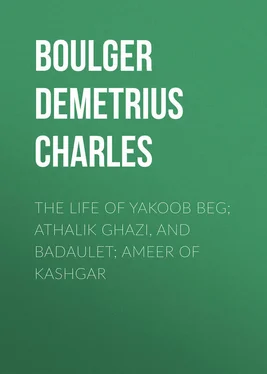Demetrius Boulger - The Life of Yakoob Beg; Athalik Ghazi, and Badaulet; Ameer of Kashgar
Здесь есть возможность читать онлайн «Demetrius Boulger - The Life of Yakoob Beg; Athalik Ghazi, and Badaulet; Ameer of Kashgar» — ознакомительный отрывок электронной книги совершенно бесплатно, а после прочтения отрывка купить полную версию. В некоторых случаях можно слушать аудио, скачать через торрент в формате fb2 и присутствует краткое содержание. ISBN: , Жанр: foreign_antique, foreign_prose, на английском языке. Описание произведения, (предисловие) а так же отзывы посетителей доступны на портале библиотеки ЛибКат.
- Название:The Life of Yakoob Beg; Athalik Ghazi, and Badaulet; Ameer of Kashgar
- Автор:
- Жанр:
- Год:неизвестен
- ISBN:http://www.gutenberg.org/ebooks/33712
- Рейтинг книги:5 / 5. Голосов: 1
-
Избранное:Добавить в избранное
- Отзывы:
-
Ваша оценка:
- 100
- 1
- 2
- 3
- 4
- 5
The Life of Yakoob Beg; Athalik Ghazi, and Badaulet; Ameer of Kashgar: краткое содержание, описание и аннотация
Предлагаем к чтению аннотацию, описание, краткое содержание или предисловие (зависит от того, что написал сам автор книги «The Life of Yakoob Beg; Athalik Ghazi, and Badaulet; Ameer of Kashgar»). Если вы не нашли необходимую информацию о книге — напишите в комментариях, мы постараемся отыскать её.
The Life of Yakoob Beg; Athalik Ghazi, and Badaulet; Ameer of Kashgar — читать онлайн ознакомительный отрывок
Ниже представлен текст книги, разбитый по страницам. Система сохранения места последней прочитанной страницы, позволяет с удобством читать онлайн бесплатно книгу «The Life of Yakoob Beg; Athalik Ghazi, and Badaulet; Ameer of Kashgar», без необходимости каждый раз заново искать на чём Вы остановились. Поставьте закладку, и сможете в любой момент перейти на страницу, на которой закончили чтение.
Интервал:
Закладка:
Aksu, one of the old capitals of Kashgar, may fairly be called the third city of the state, although it has, perhaps, more than any other declined since the expulsion of the Khitay. Before that event took place there was a road across the mountains to Ili, by the Muzart glacier, and relays of men were kept continually employed in maintaining this delicately constructed road in a state fit for passage both on foot and mounted. But all this has been discontinued for many years now, and not only is the road quite impassable, but it would require much labour and more outlay to restore it to its former utility. In the neighbourhood of this town there are rich mines of lead, copper, and sulphur. These have, practically speaking, been untouched in recent years. Coal is also the ordinary fuel among the inhabitants; and both in intelligence as well as in worldly prosperity, the good people of Aksu used to be entitled to a foremost position among the Kashgari. As a consequence of the blocking up of the Muzart Pass, the old trade with Kuldja has completely disappeared, and all communications with this Russian province are now carried on by the Narym Pass to Vernoe. This change benefits the city of Kashgar, but is a decided loss to Aksu. Aksu may still justly rank as an important place, and under very probable contingencies may regain all the ground it has lost. In conclusion, we may say that Yakoob Beg has converted its old walls and castles into fortifications, which are said to be capable of resisting the fire of modern artillery.
We have enumerated six cities – Kashgar, Yangy Hissar, Yarkand, Khoten, Ush Turfan, and Aksu – and these constitute the territory of Kashgar proper. At one time, indeed, it was called Alty Shahr, or six cities, from this fact. In addition to these may be mentioned, in modern Kashgaria, Sirikul, or Tashkurgan, in the extreme south-west, which is principally of importance as the chief post on the frontier of Afghanistan. Near Sirikul are Badakshan and Wakhan, and it has been asserted that Shere Ali, of Afghanistan, viewed with a suspicious eye the presence of Kashgar in this quarter. It is quite certain that he would not have tolerated that further advance along the Pamir, which Yakoob Beg seemed on several occasions inclined to make. Sirikul commands the northern entrance of the Baroghil Pass, and has consequently been often mentioned in recent accounts of this road to India.
Maralbashi, or Bartchuk, a military post of some strength, is strategically important, as being placed at the junction of the roads from Kashgar and Yarkand, which lead by the bed of the Yarkand river to Kucha. But it possesses greater interest for us, as being the chief town of the district inhabited by the extraordinary tribe of the Dolans. These people are in the most backward state of intelligence that it is possible to imagine human beings to be capable of. In physical strength and stature they are, perhaps, the most miserable objects on the face of the earth, but their social position is still more deplorable. Some of their customs are of the most disgusting character, and their dwellings, such as they are, are of the rudest kind and subterranean. Travellers who have seen them in the larger cities, say that all the rumours that have been circulated about them do not exaggerate the true facts of the case; and the most pitiable part of the matter is, that they have become so resigned to their degraded position, that they are averse to any measure calculated to improve their existence. They have been compared to the Bhots of Tibet, but these latter are quite superior beings in comparison with them. They are treated with contempt and derision by all the neighbouring peoples.
Kucha is, or rather was, another very flourishing city which has never recovered the loss of Chinese wealth, and the subsequent disturbances during the Tungan wars. At one time Kucha had at the least 50,000 people, and it was not less famed than Aksu for the resources and ingenuity of its people. But now it is almost a deserted city. The greater part of the old town is a mass of ruins, and during the nine years that have elapsed since the Tungani were crushed by the Athalik Ghazi, scarcely anything has been done to repair the damage caused in those very destructive wars.
Korla, Kouralia, or Kouroungli, as it has been named, and Karashar, two towns which lie to the east of Kucha, have likewise never revived from the period of anarchy and bloodshed, through which the whole of this district has passed; but even the state of these places contrasts favourably with the far worse ruin wrought at Turfan. Turfan, perhaps more than any other, profited by the trade with China, for, although it may not itself have been as rich as either Aksu or Kucha, it derived a certain source of income as the rendezvous of all the caravans proceeding either east or west, or north to Urumtsi and Chuguchak. Very often a delay of several weeks took place, before merchants had arranged all the details for crossing the Tian Shan to Guchen, or for proceeding on to Hamil through the desert, and Turfan flourished greatly thereby. Now its streets are desolate, the whole country round it is represented to be a desert, and all its former activity and brightness have completely disappeared. Yakoob Beg had extended his rule a short distance east of Turfan, to a place called Chightam, but Turfan may be styled his most eastern possession.
We have now given a somewhat detailed description of the chief cities of Kashgaria, and in doing so we have distinctly intended thereby to convey the impression to the reader that it is only these and their suburbs that were at all productive under the late régime . To those who have been to Kashgar, nothing has remained more vividly impressed on their mind, than the exceedingly prosperous appearance of the farms in the belt of country from Yarkand to Kashgar; but at the same time this wealth of foliage and of blossom has only made the barrenness of the intervening and surrounding country more palpable. The farms are certainly not small in extent, but rather isolated from each other, and surrounded by orchards of plums, apples, and other fruit trees, in which they are completely embowered. A Kashgarian village is not a main street with a line of cottages and a few large farms; but it is a conglomeration of farmsteads covering a very extensive area of country, and presenting to the eye of a stranger rather a thinly peopled district than a community of villagers. Again, although the soil is naturally fertile, the system of agriculture is of an exhaustive character, and it seems probable that only a small portion of the land on each farm is at all productive. But these settlements, which present an exterior of rural happiness and simplicity, are but oases in an enormous extent of barren country. If each proprietor seems to possess more land than he can require, and if the fertile soil produces bountifully that which is unskilfully sown therein, the total amount of land under cultivation is still very limited indeed. Worse still, the soil is gradually exhausted, and as the system of sowing but one kind of grain seems to have taken deep root among the people, it is to be feared that it may be perpetuated without hope of recovery. There is a constant difficulty to be overcome, too, on account of the meagre supply of water. The general aspect of the region is barren, a bleak expanse stretches in all directions, and in the distance on three sides the outlines of lofty ranges complete the panorama. The scarcely marked bridle track that supplies the place of a highway in every direction except where the Chinese have left permanent tokens of their presence, offers little inducement to travellers to come thither; nor must these when they do come expect anything but the most imperfect modes of communication and of supply that a backward Asiatic district can furnish. If we wish to imagine the scene along the road from Sanju to Yarkand, we have only to visit some of the wilder of the Sussex Wealds to have it before us in miniature. The spare dried-up herbage may be still more spare, and the limestone may be more protruding on the Central Asian plain; and the wind will certainly remind you that it comes either from the desert or from the mountain regions; but you have the same undulating, dreary expanse that you have above Crowborough. The miserable sheep watched by some nomad Kirghiz will alone forcibly remind you that you are far away from the heights of the South Downs. In the far distance you will see the cloud-crested pinnacles of the Sanju Devan or of the Guoharbrum, and then the traveller cannot but remember that he is in one of the most inaccessible regions in the world. But if these southern roads are scarcely worthy of the name, the great high road from Kashgar to Aksu, Kucha, Korla, Karashar, and Turfan is a masterpiece of engineering construction. It need not fear to brave comparison with those of imperial Rome herself, and remains an enduring monument to Chinese perseverance, skill, and capacity for government. In China itself there are many great and important highways, but there the task was facilitated by the possession of great and navigable rivers. In Eastern Turkestan no such assistance was to be found, and consequently this road, along which was conducted all the traffic that passed from China to Jungaria, Kashgar, Khokand, and Bokhara, had to be maintained in the highest state of efficiency. To do this we cannot doubt was a most expensive undertaking, and, not mentioning such an exceptional work as the Muzart Pass, one that required a very perfect organization to accomplish with the success that for more than a century marked it.
Читать дальшеИнтервал:
Закладка:
Похожие книги на «The Life of Yakoob Beg; Athalik Ghazi, and Badaulet; Ameer of Kashgar»
Представляем Вашему вниманию похожие книги на «The Life of Yakoob Beg; Athalik Ghazi, and Badaulet; Ameer of Kashgar» списком для выбора. Мы отобрали схожую по названию и смыслу литературу в надежде предоставить читателям больше вариантов отыскать новые, интересные, ещё непрочитанные произведения.
Обсуждение, отзывы о книге «The Life of Yakoob Beg; Athalik Ghazi, and Badaulet; Ameer of Kashgar» и просто собственные мнения читателей. Оставьте ваши комментарии, напишите, что Вы думаете о произведении, его смысле или главных героях. Укажите что конкретно понравилось, а что нет, и почему Вы так считаете.












